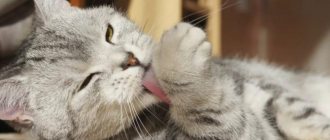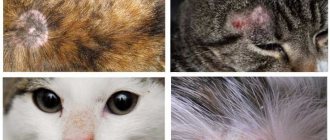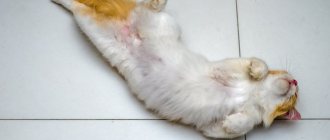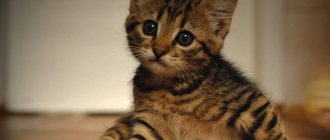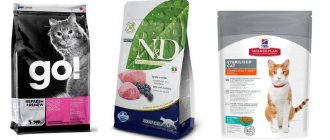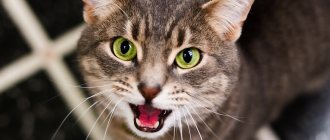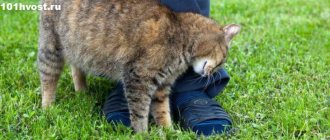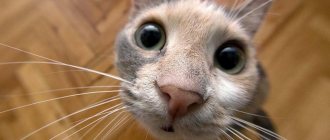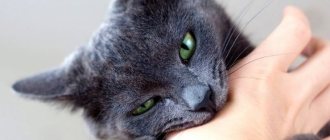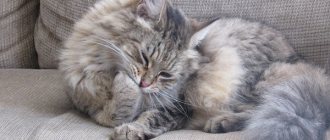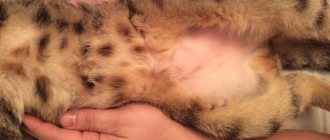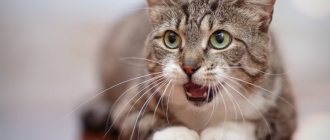10081Administration
Some owners find it very funny that their cat constantly licks itself. But there's not much fun in this. There are often cases where it is better to establish the exact reason for this behavior of your furry pet.
Cats lick their lips due to intense salivation. This does not mean that he is sick, but something is definitely bothering him, he is stressed or uncomfortable. In any case, if a cat constantly licks its lips, you need to observe it for several days and take into account other symptoms, manifestations and its behavior.
Main reasons
Reflex actions
A cat licks itself because it is its natural reflex, and it does not matter the breed of the animal or its lifestyle. A pet often licks its nose under the influence of the following factors:
- Variety of food. When a cat sees food or smells it, it reflexively begins to lick itself.
- Desire to drink. The problem often occurs in cats during the hot season or if the owners feed him dry food. It is important to ensure your pet has constant access to clean drinking water.
- Stress factor. If a cat is worried, he will often lick his nose and other parts of his body. In this way, the pet tries to calm down and get rid of unpleasant odors in the fur.
Veterinarians note that representatives of the cat family have very dry noses during sleep, as a result of which the cat periodically licks its lips and nose. This is due to blunting of receptor functions.
Attacks of nausea
An attack of nausea and vomiting in an animal provokes increased activity of the salivary glands, which is why it swallows and licks.
If your cat is constantly licking his lips and swallowing saliva, this may indicate impending vomiting. When a pet vomits, the function of the salivary glands increases, which is why the animal often smacks its lips. According to some studies, the bactericidal and lubricating properties of salivary fluid help prevent vomiting and facilitate the movement of processed foods in the larynx.
Worm infestation
If a kitten or adult frequently licks its lips, then it is worth checking your pet to see if it has worms. With helminthiasis, the animal is bothered by constant itching in the abdomen and other parts of the body. With intensive licking and scratching, wounds soon appear on the skin, which can become infected. In order to lick wounds, the cat produces more saliva.
Nervous tension
During washing, if there is severe overexcitation or if there is a feeling of danger, the pet feels stressed and anxious. Also, increased saliva production and frequent licking can be observed during estrus. When a cat licks itself, it calms itself and brings the state of its nervous system back to normal. In this case, owners should provide peace to the pet, if possible, calm it down and pet it more often.
Features of overgrooming
Under the influence of stress or dermatological pathologies, overgrooming can turn into a bad habit.
The disorder is characterized by frequent licking of the cat's fur. Various factors can influence pathology:
- dermatological diseases and diseases leading to skin problems;
- exposure to stress;
- unsanitary conditions in the cat’s habitat.
If your pet constantly licks its belly and other parts of its body, it will soon become restless. Overgrooming negatively affects the behavior of a pet and turns into a bad habit. If you don’t go to a veterinary clinic in time and start treating your cat, he will produce a large amount of saliva, as a result of which he needs to lick his lips often. Eliminating the problem requires a comprehensive therapeutic approach and patience on the part of the owners.
Manifestation of claustrophobia
If the cat often swallows, becomes nervous and does not eat, then this may indicate the manifestation of a similar pathology. Fear of confined spaces is observed in many cats, which can negatively affect the state of the pet’s nervous system. When a pet is nervous, its reflexes become stronger, resulting in hypersalivation, which the cat tries to get rid of by frequent licking.
Process Features
In the animal's body, saliva performs a number of important functions. First of all, it protects the cat’s teeth, gums and oral mucosa from any damage. It softens food to make it easier to swallow. And besides, it stimulates the receptors of the tongue.
This fluid is constantly produced by your pet's salivary glands. And when strong salivation occurs, it, accordingly, flows abundantly from the cat’s mouth. This process is called hypersalivation. And there can be many reasons for this phenomenon.
We invite you to familiarize yourself with the Jack Russell Terrier breed description, characteristics
What to do and how to help your pet?
Unhealthy licking of fur must be treated, for which the reasons that caused such behavior of the animal are eliminated and sedatives are given.
If the cat does not lick itself or, on the contrary, licks itself often, then find out what the causes of the problem are. Owners should determine whether there are fleas and other small parasites on the animal’s fur and skin. It is also recommended to remember whether the cat could have an allergy to the new shampoo or other irritants. To eliminate constant licking, you need to act on the original source of the problem. If the disorder is triggered by stress, the animal needs to be calmed, stroked, or given a sedative. When a cat does not lick itself or, on the contrary, constantly licks its fur due to claustrophobia, then it is worth giving the pet more space. If the source of licking is an infectious or other disease, then drug therapy using the following groups of drugs may be required:
- antibiotics;
- antimicrobial agents;
- sedatives;
- antihistamines.
To prevent frequent licking in cats, it is necessary to regularly carry out deworming, preventing the activity of worms in the cat's body.
Why is this happening
There can be a number of reasons why a cat may be drooling. They are divided into several categories. And according to this, you can easily determine why your pet is drooling so profusely.
Main reasons
The most serious disease may be an infection or even the presence of a neoplasm in the animal’s body. In the case of such a disease, extremely profuse salivation is observed. The situation is similar when a cat is poisoned. In addition to increased drooling, the pet appears lethargic, loses appetite, and may vomit.
Such symptoms are the cause of gastrointestinal diseases. In addition, it could be allergic reactions or the presence of helminths in the pet. And this can be triggered by untimely treatment for worms or a late vaccination.
A more dangerous disease is rabies. And when a cat drools from its mouth due to the presence of this disease, it is necessary to begin treatment immediately. After all, such a disease is considered very dangerous not only for animals, but also for humans.
When do you need to see a veterinarian?
If your cat does not lick itself or, on the contrary, licks itself vigorously for several weeks or months, then you should consult a specialist. It is especially necessary to contact a veterinary clinic when the pet is lethargic and refuses water. Consultation with a veterinarian is necessary for hair loss and the appearance of bald patches. An allergic reaction that causes a cat to lick itself often can rarely be dealt with on its own. It is imperative to consult a specialist if you have nausea and vomiting, which may indicate impaired functioning of the kidneys, liver and urinary system. To make a diagnosis, the doctor will prescribe various procedures, based on the results of which further treatment is selected.
Diseases of internal organs
Increased salivation may be a sign of some diseases of the animal’s internal organs:
- genitourinary;
- gallbladder;
- liver;
- kidney
Most pathologies of internal organs in the initial stages of development are asymptomatic.
The first signs appear only as the disease progresses. Accordingly, not every owner will be able to independently determine the disease. Therefore, the diagnosis should be carried out by a veterinarian.
If the animal’s condition is too serious, it cannot be postponed; you must immediately contact the clinic for examination. Timely diagnosis will allow you to quickly get rid of the disease and prevent it from becoming chronic.
Symptomatic treatment
The symptom does not require treatment, you need to find out and eliminate the cause. If possible, it is better to take the animal to the veterinarian. Because serious infectious diseases, for example, diabetes or kidney pathology, cannot be independently identified or cured. You can independently examine the animal’s oral cavity, and, if the cat is allowed to remove the fishing line or remove the rain, another foreign object. You can feel the abdomen (hard/soft, painful/painless). And monitor the symptoms associated with frequent swallowing.
In addition to swallowing, the following symptoms should alert you:
- the cat may hiss and meow;
- breathing becomes irregular or heavy;
- the animal is lethargic and refuses to eat;
- saliva continuously flows from the mouth;
- bleeding gums appear;
- the cat has abdominal pain, diarrhea, fever and belching;
- the cat loses consciousness (in this case, you need to run to the vet very urgently, as the minutes are counting).
At the clinic, a specialist will examine the animal, conduct an examination and give recommendations for treatment.
If there are no serious problems, the pet and the owner will be sent home.
A serious condition is a reason to leave the cat under the supervision of specialists. In some cases, the veterinarian will prescribe IVs and injections, then the cat will also have to be left in the hospital.
When the underlying disease is eliminated, excessive swallowing, excessive viscosity of saliva and other unpleasant symptoms will go away. To prevent the situation from recurring, you need to follow the care recommendations and bring your cat for a consultation with a veterinarian once a year (for the first time after a serious illness, it is recommended to do this once every 2-3 months).
The cat swallows often
Cats make swallowing movements several dozen times a day.
This process begins to attract the attention of the owner when the animal swallows almost constantly, or this symptom is accompanied by other manifestations. Swallowing is the voluntary process of moving saliva from the nose or food from the mouth into the pharynx and then into the esophagus. Swallowing food can be roughly divided into 3 stages (the first 2 of them can be performed consciously, the last only automatically):
- Preparation or oral phase. Food goes through a stage of salivation and chewing. Then it is fed onto the back of the tongue to move into the pharynx.
- Pharyngeal phase. This is the section of the food tract from the oral cavity to the esophagus. Passing through this area, food enters the esophagus.
- Esophageal phase. Food moves down the esophagus towards the stomach and enters the stomach.
Swallowing liquid or saliva occurs according to the same principle: saliva or water accumulates in the oral cavity, moves towards the pharynx, a swallowing movement is made and it enters the esophagus, and then into the stomach.
Etiology
Pharyngeal dysphagia in dogs and cats occurs primarily as an acquired disorder due to neuropathy, myopathy, and synaptic dysfunction (for example, localized myasthenia gravis). Failure to form a normal food bolus at the base of the tongue and/or to push the bolus into the esophagus is often associated with damage to cranial nerves IX or X. Concurrent dysfunction of the cranial esophagus can result in food retention just behind the cricopharyngeal sphincter.
We recommend reading: Veterinary Medicine Demodicosis in Cats
